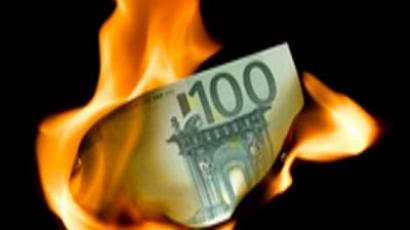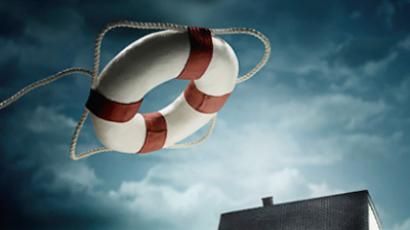By the banks, we sat down and wept

As a wave of public demonstrations over austerity measures sweeps Europe, it is the role of the banking system in the lead up to the financial crisis which needs to be considered.
In an extension of the global financial crisis, the countries of Europe are enduring their own independent troubles over sovereign debt and speculation of what will happen if they default on their loans. As different countries hang on the apparent verge of bankruptcy, governments are taking drastic action to cut spending in any way they can. This in turn has caused the citizens of these countries to be upset — and justifiably so. While the current solution of austerity seems straightforward, the trick is trying to understand how the current state of affairs came to pass and which parties are responsible.
Greek monetary mythology
Fully understanding the recipe that created the current European sovereign debt crisis at this point may prove difficult, but it is possible to identify some of the core ingredients. Individual governments are certainly to blame in part, as well as the role of the United States financial organizations in over-leveraging themselves with the sub-prime loan scandal, but a group of European banking institutions also bears a significant portion or responsibility in the matter. The financial shell-game between governments and international banking institutions has proven toxic, leaving the general public to deal with the harsh consequences.If the world had not been alerted to the problem through the Icelandic meltdown of 2008, or the banking bailouts of the UK, US, and Eurozone, the real sense of it meaning something at a day-to-day level became manifest in early 2010, when Greece was pushed close to sovereign default.Throughout the previous decade, Greece enjoyed a strong economy with rapid growth of an average of more than four per cent each year. While a strong, growing economy is traditionally a wonderful thing, the Greek growth miracle hid an economic malaise which stemmed from appalling budgetary management, with massive public spending on large social programs and infrastructure projects, and was in part reflective of Greece’s accession to the Eurozone.It had long been known that the means used to bring Greece into the Eurozone had involved complex financial instruments used to disguise the budgetary situation in the country, with major European and global banks being key advisors to the Greek government and also the sellers of the instruments used to blur the real budgetary situation. In 2007, when the world was just starting to feel the crunch of the crisis, the overspending by the Greek government came back to haunt them in a big way.Former British Prime Minister Gordon Brown was in power as the situation in Greece was playing out. In a December 13, 2010 interview with Jon Stewart, the former premier expanded on just how responsible European banks were for the current situation. “It does come back to the banks, you know, if you look at the problems that we had to face. They were over-leveraged, they didn’t have enough capital, they had spent the money rewarding themselves instead of having stability for the banks, and then the markets froze up,” Brown said.In order to head off a sovereign default, and with global bond markets pricing them out, in May 2010, Greece had to look to the other Eurozone countries and the International Monetary Fund (IMF) for a bailout to the tune of €110 billion. In exchange for its financial reprieve, Greece agreed to a series of austerity measures. In essence, like most regular folks in the real world, Greece was forced to start living within its means.
Calling the banks to account
While it is easy to make an example of Greece, Portugal, Ireland, Italy, Spain and Belgium are in similar situations to varying degrees, and along with Greece, they have earned the unceremonious acronym PIIGS from the remaining Eurozone countries. An interesting point is that each of the PIIGS countries, along with other nations, has banks that are members of loosely-connected network called the Inter-Alpha Group. It is also interesting to point out that many of the Inter-Alpha banks have needed government support, meaning additional costs on budgets and nations already under pressure from an economic downturn.One example is the Allied Irish Bank (AIB). Just prior to the 2008 credit crunch, AIB was the proud owner of €47 billion in loans, far more than any other bank in Ireland at the time.Unfortunately for AIB executives, Ireland, like the rest of the world, fell into economic despair and AIB’s profit fell by nearly 70 per cent. Now AIB has been forced to transfer more than €19 billion of its debt to the government, a move that has stressed Ireland’s taxpayers. Unfortunately for Ireland, the country does not have the ability to sustain such debt and now, like Greece, it has been forced to turn to the EU and IMF for a bailout of their own.You would think that sustaining billions in losses and needing government survival money would be embarrassment enough for a bank to change its ways, but alas this is not the case. It seems that just this week AIB was poised to pay out nearly £34 million in bonuses this year to its staff. Against the notion of self-reward in a time when the company has failed, Ireland’s Finance Minister Barry Lenihan has warned AIB to not pay out those bonuses. Lenihan does have some leverage over the bank, as nearly 19 per cent of AIB is owned by Irish taxpayers.In simple terms, if you don’t have money, you can’t spend it. This is the conventional wisdom that most people understand, and the financial model banks use to their own gain. The problem is, those same banks have not been heeding their own rules, purchasing debt that they do not have the capital to cover. In recovering from the global crisis, governments are in a position to make severe cutbacks and changes in policy to account for the hemorrhaging of money, much to the dismay of their citizens.It seems that no country is immune. In December, Spain voted to privatize partially the national lottery, as well as portions of the transportation authority in the country. Italy’s austerity plans include cutting health spending, government pay cuts between 2011 and 2013 and not replacing 20 per cent of employees who leave their positions in the coming years.While many countries in Europe are looking internally at ways to cut spending, critics are saying that the only way out of the crisis is to initiate true reform in the banking industry. If banks continue to act in their own interests without regard to international consequences, then the cycle is sure to continue.
Sean Thomas, RT














